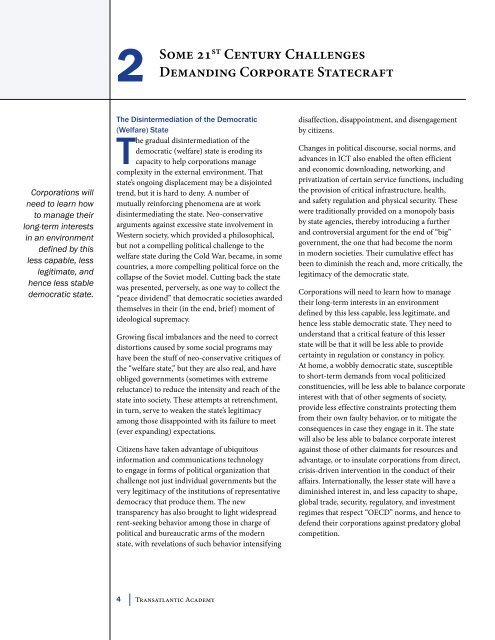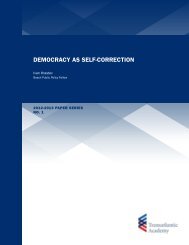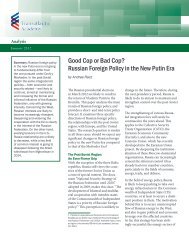CORPORATE STATECRAFT - Transatlantic Academy
CORPORATE STATECRAFT - Transatlantic Academy
CORPORATE STATECRAFT - Transatlantic Academy
You also want an ePaper? Increase the reach of your titles
YUMPU automatically turns print PDFs into web optimized ePapers that Google loves.
2Some 21 st Century ChallengesDemanding Corporate StatecraftCorporations willneed to learn howto manage theirlong-term interestsin an environmentdefined by thisless capable, lesslegitimate, andhence less stabledemocratic state.The Disintermediation of the Democratic(Welfare) StateThe gradual disintermediation of thedemocratic (welfare) state is eroding itscapacity to help corporations managecomplexity in the external environment. Thatstate’s ongoing displacement may be a disjointedtrend, but it is hard to deny. A number ofmutually reinforcing phenomena are at workdisintermediating the state. Neo-conservativearguments against excessive state involvement inWestern society, which provided a philosophical,but not a compelling political challenge to thewelfare state during the Cold War, became, in somecountries, a more compelling political force on thecollapse of the Soviet model. Cutting back the statewas presented, perversely, as one way to collect the“peace dividend” that democratic societies awardedthemselves in their (in the end, brief) moment ofideological supremacy.Growing fiscal imbalances and the need to correctdistortions caused by some social programs mayhave been the stuff of neo-conservative critiques ofthe “welfare state,” but they are also real, and haveobliged governments (sometimes with extremereluctance) to reduce the intensity and reach of thestate into society. These attempts at retrenchment,in turn, serve to weaken the state’s legitimacyamong those disappointed with its failure to meet(ever expanding) expectations.Citizens have taken advantage of ubiquitousinformation and communications technologyto engage in forms of political organization thatchallenge not just individual governments but thevery legitimacy of the institutions of representativedemocracy that produce them. The newtransparency has also brought to light widespreadrent-seeking behavior among those in charge ofpolitical and bureaucratic arms of the modernstate, with revelations of such behavior intensifyingdisaffection, disappointment, and disengagementby citizens.Changes in political discourse, social norms, andadvances in ICT also enabled the often efficientand economic downloading, networking, andprivatization of certain service functions, includingthe provision of critical infrastructure, health,and safety regulation and physical security. Thesewere traditionally provided on a monopoly basisby state agencies, thereby introducing a furtherand controversial argument for the end of “big”government, the one that had become the normin modern societies. Their cumulative effect hasbeen to diminish the reach and, more critically, thelegitimacy of the democratic state.Corporations will need to learn how to managetheir long-term interests in an environmentdefined by this less capable, less legitimate, andhence less stable democratic state. They need tounderstand that a critical feature of this lesserstate will be that it will be less able to providecertainty in regulation or constancy in policy.At home, a wobbly democratic state, susceptibleto short-term demands from vocal politicizedconstituencies, will be less able to balance corporateinterest with that of other segments of society,provide less effective constraints protecting themfrom their own faulty behavior, or to mitigate theconsequences in case they engage in it. The statewill also be less able to balance corporate interestagainst those of other claimants for resources andadvantage, or to insulate corporations from direct,crisis-driven intervention in the conduct of theiraffairs. Internationally, the lesser state will have adiminished interest in, and less capacity to shape,global trade, security, regulatory, and investmentregimes that respect “OECD” norms, and hence todefend their corporations against predatory globalcompetition.4<strong>Transatlantic</strong> <strong>Academy</strong>









